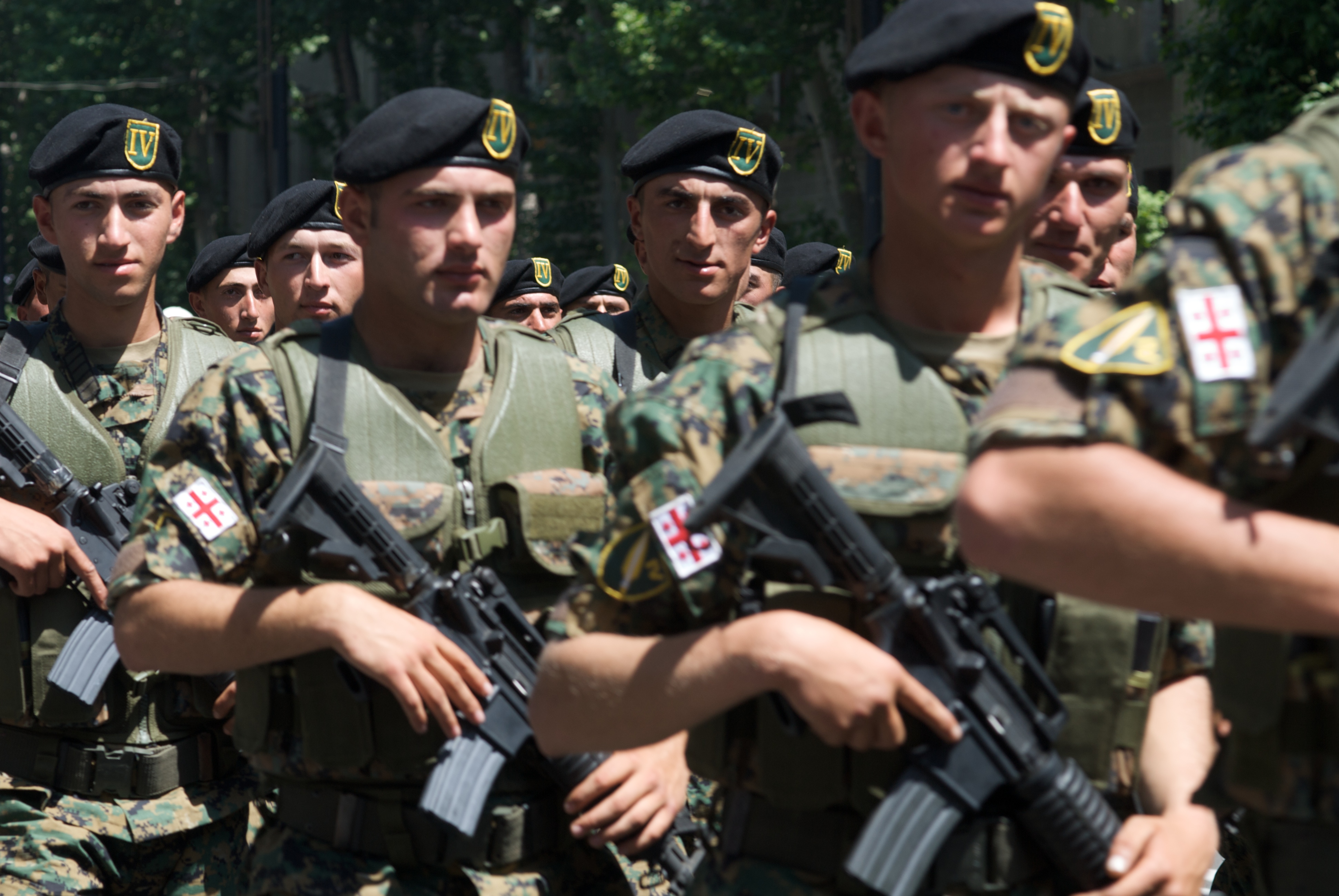
Georgian Soldiers Go to Africa
Publication: Eurasia Daily Monitor Volume: 11 Issue: 39
By:

In his annual State of the Nation address in the parliament (https://www.civil.ge/eng/article.php?id=26971), Georgian President Giorgi Margvelashvili stated that he agreed to the request of Catherine Ashton, the High Representative of the European Union for Foreign Affairs and Security Policy, regarding Georgia’s contribution to international peacekeeping activities in the Central African Republic. “Georgia’s participation in such missions increases not only the world’s security, but also the security of our country. Therefore, I, as the supreme commander [of the Armed Forces], consider it expedient to send an infantry brigade for participation in the peacekeeping operation led by the EU in Central Africa. I call on the parliament to support this decision,” President Margvelashvili stated.
According to the new constitution, which turns the country from a presidential to a parliamentary-presidential system, Georgia’s military forces can be deployed abroad only with the parliament’s consent. “The law requires that this should be done within 24 hours after the president signs a decree about sending the military to another country. If the parliament does not agree, the decree loses its power,” analyst Petre Mamradze told Jamestown (Author’s interview, February 20). Indeed, within an hour after the head of state finished his speech, 106 members of the parliament voted in favor of sending Georgian troops to the Central African Republic; only one member of the parliament voted against (https://agenda.ge/news/9129/eng).
It appears that the decision about sending Georgian peacekeepers to Central Africa originally came not from President Margvelashvili, but from the government—first and foremost from Prime Minister Irakly Garibashivili and Minister of Defense Irakly Alasania. Immediately after this decision was taken, the prime minister left for the United States. Defense Minister Alasania said, “We have carefully reviewed the EU’s proposal at a [top-level] government meeting and decided to join the operation in the Central African Republic. This mission is justified on both humanitarian and moral grounds. Apart from that, it is very important that the European Union is implementing the mission on the basis of the [United Nations] mandate” (https://www.civil.ge/eng/article.php?id=26962).
The formal government decision to send troops abroad does not mean that Georgian forces will go to Central Africa within the next few days. “To pave the way for such an operation, preliminary preparations will have to take place first,” including a visit to Africa by military authorities to examine the situation on the ground, Teona Akubardia, an expert on international peacekeeping operations, said in an interview with Jamestown on February 17. “So realistically, the Georgian military will be deployed there no earlier than the end of April or May” Akubardia added (Author’s interview, February 17).
Military expert Nodar Kharshiladze told Jamestown that the plan is to dispatch no more than 100 Georgian military personnel at the initial stage. “But even for that, considerable logistical work needs to be carried out, so this decision can be implemented only after several months,” Kharshiladze argued (Author’s interview, February 20). The Georgian Ministry of Defense could not provide any details on when exactly the military would be sent to Central African Republic. Apart from that, a source close to the military, told Jamestown on February 20 that the Georgian forces in Central African Republic may increase over time.
Georgia has actively participated in various international operations. Notably, between 2007 and 2008, Georgian forces in Iraq—2,000 strong—briefly composed the third-largest contingent after the United States and the United Kingdom (https://www.civil.ge/eng/article.php?id=15242). Moreover, Georgia sent 1,700 military personnel to serve in Kabul and Helmand province in Afghanistan. In the past two years, 29 Georgian soldiers were killed and hundreds sustained injuries while serving alongside Western allies there (https://www.nato.int/cps/en/natolive/news_101633.htm?selectedLocale=en). Yet, despite its large commitment to the Afghanistan peacekeeping mission, as well as its troops’ considerable sacrifices, Georgia has not managed to obtain a Membership Acting Plan (MAP) to join the North Atlantic Treaty Organization (NATO). Tbilisi’s membership hopes were met with stiff resistance, primarily from Germany and France, which do not want to jeopardize their relations with Russia. “It cannot be ruled out that by its active participation in this peacekeeping operation [in Central Africa], the Georgian authorities want to [encourage] those forces in NATO that are not opposed to granting MAP for Georgia. But this intention is fairly naïve, as no one wants to irritate Moscow. Also, NATO adopts its decisions based on consensus; if just one country is against it, Georgia will not receive MAP at the next [Alliance] summit in Wales,” defense and security columnist Zurab Gogoberidze told Jamestown on February 20.
Therefore, the decision of the new Georgian government to dispatch troops to the Central African Republic was likely not simply tied to calculations about growing closer to NATO or receiving greater security guarantees from the West vis-à-vis Russia. Rather, the pledge to send peacekeepers abroad may have also been related to increasing the Georgian army’s prestige in society. It was no accident that the parliament voted on Georgia’s participation in a foreign mission on the eve of a memorable anniversary. On February 21–25, 1921, Georgian cadets died in clashes with the Red Army’s vastly superior forces on the outskirts of the capital (https://www.apsny.ge/2014/pol/1393204603.php).
Judging by the attitude of the new leaders of the country toward this anniversary, one can deduce that the leading politicians in the Georgian Dream coalition are trying to continue the pro-Western course of former president Mikheil Saakashvili. The coalition includes such pro-Western political figures as Minister of Defense Alasania from the Party of Free Democrats as well as parliamentary speaker David Usupashvili from the Republican Party. Even if this course does not result in the country’s full integration with NATO and the EU in the near future, it will, nevertheless, help to maintain Georgia’s international credentials as a consistent ally of the West. This is especially important to the government now as Georgia consciously continues to assess itself against Ukraine, whose earlier last-minute refusal to sign the Agreement of Association with the EU put the country on the brink of civil war.




